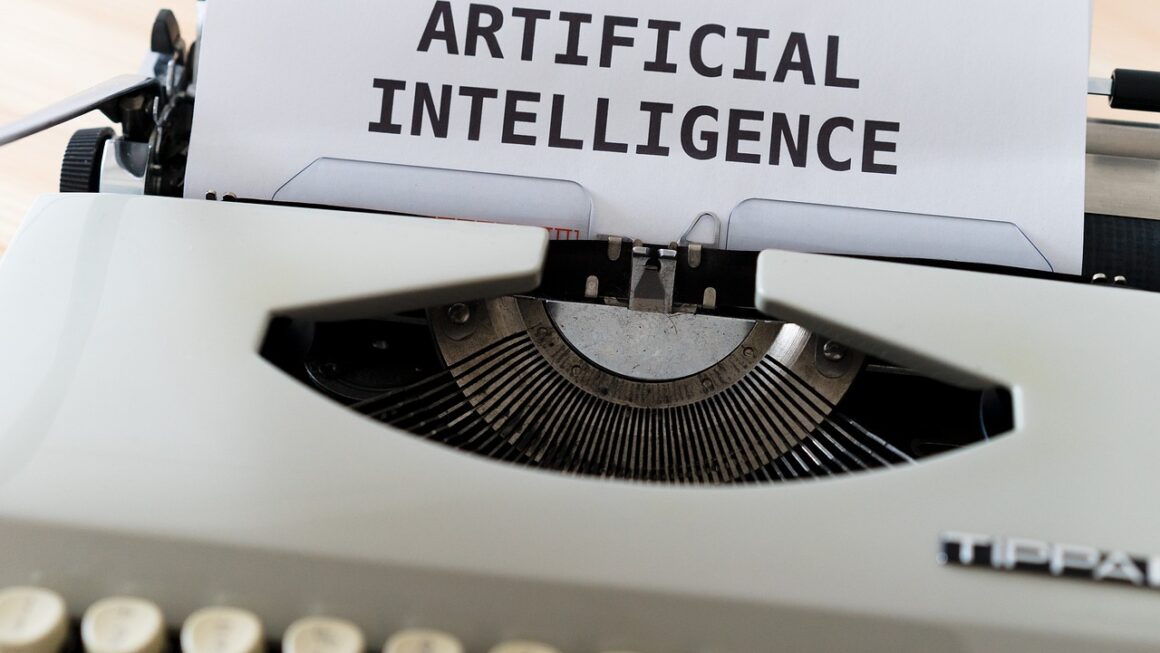AI is rapidly transforming the digital landscape, and perhaps no area is seeing more disruption than content creation. From automating simple tasks to generating entirely new forms of content, artificial intelligence offers exciting opportunities for businesses and individuals looking to streamline their workflows and enhance their content strategy. This blog post will delve into the multifaceted role of AI in content creation, exploring its capabilities, benefits, and potential challenges.
The Rise of AI-Powered Content Creation
What is AI Content Creation?
AI content creation refers to the use of artificial intelligence technologies, such as natural language processing (NLP) and machine learning (ML), to automate or assist in the process of creating written, visual, or auditory content. Instead of relying solely on human writers, designers, and audio engineers, AI tools can generate blog posts, social media updates, images, videos, and even music. These tools are trained on massive datasets, allowing them to learn patterns and generate new content that mimics human-created outputs.
The Evolution of AI in Content
The application of AI in content creation has evolved significantly over the years. Initially, AI tools were primarily focused on tasks like grammar and spell checking. However, with advancements in deep learning, AI now possesses the ability to:
- Generate original text from scratch based on specified prompts.
- Translate content between languages with increasing accuracy.
- Summarize lengthy articles or documents.
- Create personalized content recommendations for users.
- Generate images and videos from text descriptions.
The evolution has been driven by increasing computing power, larger datasets for training AI models, and algorithmic advancements.
Current State and Future Trends
Currently, AI content creation tools are widely used across various industries, from marketing and advertising to journalism and education. Some prominent examples include:
- Jasper: A popular AI writing assistant for generating blog posts, social media content, and marketing copy.
- Copy.ai: Another AI-powered tool designed to create a wide range of marketing content.
- Article Forge: Specializes in generating long-form articles with minimal human input.
- Dall-E 2 & Midjourney: Powerful AI image generators creating visuals from textual prompts.
Looking ahead, we can expect AI content creation to become even more sophisticated. Future trends include:
- Hyper-personalization: AI will enable the creation of highly personalized content tailored to individual user preferences.
- Multimodal content generation: AI will be capable of seamlessly integrating text, images, audio, and video into cohesive content experiences.
- Improved accuracy and creativity: AI models will continue to improve in their ability to generate accurate, engaging, and original content.
Benefits of Using AI in Content Creation
Increased Efficiency and Productivity
AI tools can significantly speed up the content creation process, freeing up human creators to focus on more strategic tasks. Consider these benefits:
- Faster content production: AI can generate drafts of articles, social media posts, or email campaigns in a fraction of the time it would take a human writer.
- Reduced workload for content teams: By automating repetitive tasks like keyword research, topic ideation, and content optimization, AI can alleviate the burden on content teams.
- 24/7 availability: AI tools can work around the clock, ensuring a constant flow of content production.
- Example: A marketing team using AI to generate different versions of ad copy for A/B testing could increase their click-through rates and conversions without requiring extra manpower.
Enhanced Content Quality and Consistency
AI not only speeds up the process but can also improve the overall quality and consistency of content.
- Improved grammar and spelling: AI-powered grammar checkers can identify and correct errors more accurately than traditional tools.
- Consistent brand voice: AI can be trained to adhere to a specific brand voice and style, ensuring consistency across all content.
- Data-driven content optimization: AI can analyze data to identify high-performing topics and keywords, helping creators optimize their content for better results.
- Example: A company with multiple blog authors can use AI to ensure that all articles conform to the company’s style guide and maintain a consistent tone.
Cost Savings
Utilizing AI in content creation can lead to significant cost savings in the long run.
- Reduced reliance on freelancers: AI can handle tasks that would otherwise require hiring freelance writers or editors.
- Lower content creation costs: By automating content creation, AI can reduce the overall cost per piece of content.
- Increased ROI: AI-driven content optimization can lead to higher engagement, better search engine rankings, and ultimately, a greater return on investment.
- Example: A small business can use AI tools to generate social media content, eliminating the need to hire a social media manager.
Improved SEO Performance
AI can be a valuable asset in optimizing content for search engines.
- Keyword research: AI can quickly identify relevant keywords for a given topic.
- On-page optimization: AI can suggest ways to optimize titles, meta descriptions, and headings for better SEO.
- Content gap analysis: AI can identify topics that are missing from a website’s content library.
- Example: An SEO agency uses AI to analyze a competitor’s website, identify their top-performing keywords, and create content that targets those keywords.
Challenges and Limitations of AI Content Creation
Lack of Creativity and Originality
While AI can generate content that is grammatically correct and factually accurate, it often struggles to replicate the creativity and originality of human writers.
- Generic content: AI-generated content can sometimes sound generic and lacking in personality.
- Inability to think outside the box: AI may struggle to come up with truly innovative or original ideas.
- Dependence on training data: AI models are limited by the data they are trained on, which may not always reflect the latest trends or insights.
- Example: AI might be able to write a basic blog post about a common topic, but it is unlikely to produce a groundbreaking piece of thought leadership.
Ethical Considerations
The use of AI in content creation raises several ethical concerns.
- Plagiarism: AI-generated content can sometimes inadvertently plagiarize existing material. It’s crucial to verify the originality of any AI-generated content.
- Bias: AI models can inherit biases from the data they are trained on, leading to content that is discriminatory or unfair.
- Transparency: It is important to be transparent about the use of AI in content creation, especially when generating news or opinion pieces.
- Example: An AI model trained on data that is predominantly from one demographic group may generate content that is biased against other demographic groups.
The Need for Human Oversight
Despite the advancements in AI, human oversight is still essential.
- Fact-checking: AI-generated content should always be fact-checked by a human to ensure accuracy.
- Editing and polishing: AI-generated content often requires editing and polishing to improve its readability and engagement.
- Strategic direction: Humans are needed to provide strategic direction and ensure that content aligns with business goals.
- Example: A marketing team should always review and edit AI-generated content before publishing it to ensure that it is accurate, engaging, and consistent with the brand’s message.
Potential for Misinformation
The ability of AI to generate realistic-sounding content raises concerns about the spread of misinformation.
- Fake news: AI can be used to generate fake news articles that are difficult to distinguish from real news.
- Deepfakes: AI can be used to create realistic-looking videos of people saying or doing things they never actually did.
- Mitigation Strategies:
- Implement robust fact-checking processes.
- Educate the public about the risks of AI-generated misinformation.
- Develop technologies to detect and flag AI-generated content.
Practical Applications of AI in Different Content Formats
Blog Posts and Articles
AI can be used to generate:
- Initial drafts of blog posts based on keyword research.
- Summaries of existing articles.
- Different versions of headlines and meta descriptions for A/B testing.
- Actionable Tip: Use AI to generate several draft outlines for a blog post, then select the one that best aligns with your content strategy.
Social Media Content
AI can help with:
- Creating engaging social media posts based on trending topics.
- Scheduling social media posts for optimal engagement.
- Generating captions for images and videos.
- Actionable Tip: Use AI to generate several variations of a social media post, then A/B test them to see which one performs best.
Email Marketing
AI can be used for:
- Personalizing email subject lines and body copy.
- Segmenting email lists based on user behavior.
- Generating product descriptions for e-commerce emails.
- Actionable Tip: Use AI to personalize email subject lines based on the recipient’s name and past purchase history.
Video Content
While more nascent, AI is emerging to help with:
- Generating scripts and storyboards for videos.
- Creating automated subtitles and translations for videos.
- Generating short video clips from long-form content.
- Actionable Tip: Experiment with AI tools that create video snippets from existing blog posts to repurpose your content for different platforms.
Conclusion
AI is undoubtedly revolutionizing content creation, offering significant benefits in terms of efficiency, quality, and cost savings. While there are challenges and limitations to be aware of, such as the need for human oversight and the potential for misinformation, the advantages of using AI in content creation are becoming increasingly clear. By embracing AI as a tool to augment human creativity, businesses and individuals can unlock new possibilities and achieve greater success in their content endeavors. As the technology continues to evolve, we can expect AI to play an even more significant role in shaping the future of content.




